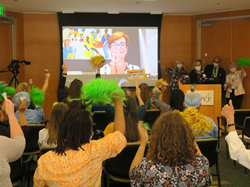
Mercy Medical Center staff receive news of earning MAGNET recertification for the 3rd time (2011, 2016, 2021)
“For the third consecutive time since 2011, Mercy Nursing has earned this coveted recognition. Magnet is the most prestigious distinction a health care organization can receive for nursing excellence,” said Dr. David Maine, President and CEO, Mercy Health Services, Mercy Medical Center
BALTIMORE, Md. (PRWEB)
June 25, 2021
At approximately 12:30 p.m. on Thursday, June 17th, 2021, Mercy Medical Center nurses and executive staff received word that the 147-year-old Catholic hospital had re-earned the coveted “Magnet®” recognition from the American Nurses Credentialing Center® (ANCC). Mercy is among the less than eight percent of all hospitals in the U.S. to have Magnet-certified programs.
The Magnet Recognition Program® recognizes the top health care organizations in the nation for providing nursing excellence. Mercy first earned the Magnet credential in 2011 when it first joined a select group of about 400 of nearly 6,000 U.S. healthcare organizations, then re-earned the designation in 2016.[i]
“For the third consecutive time since 2011, Mercy Nursing has earned this coveted recognition. Magnet is the most prestigious distinction a health care organization can receive for nursing excellence,” said Dr. David Maine, President and CEO, Mercy Health Services, Mercy Medical Center. “This is a truly tremendous achievement especially as all the preparation for our application and our official visit from the ANCC occurred in the midst of a global pandemic. On behalf of the Sisters of Mercy, the Board of Trustees and the Senior Leadership team, congratulations to the entire Nursing Division for being officially recognized as among the very best in the nation,” Dr. Maine added.
Magnet recognition has become the gold standard for nursing excellence and is taken into consideration when the public judges healthcare organizations. In fact, U.S. News & World Report’s annual showcase of “America’s Best Hospitals” – which has noted Mercy among the nation’s finest — includes Magnet recognition in its ranking criteria for quality of inpatient care.
“There are 750 nurses serving patients in 22 units at Mercy, and every nurse is dedicated to delivering innovative and compassionate care. To earn Magnet status once again reflects our staff’s commitment to our patients, their families and to the communities they serve,” said Kim Schwenk, Chief Nursing Officer and Vice President of Patient Care Services.
“What we do for our patients, the excellent care that we give, its ingrained in us. It’s the Mercy culture; the teamwork has been incredible and it shows. Once more earning Magnet status is a testament to our strength, our loyalty and our commitment to delivering quality patient care in a compassionate setting,” said Susan Finlayson, Mercy Senior Vice President of Operations.
The process for achieving Magnet status includes a rigorous evaluation of nursing policies, practices and procedures to ensure they are consistent with national benchmark standards. In addition, the process includes a 3-day site visit from the American Nurses Credentialing Center.
Given infection protocols relevant to the ongoing COVID-19 pandemic, the review by Magnet surveyors was virtual, and involved input from patients, hospital staff and community partners to assess the quality of nursing care delivered by Mercy nurses.
Magnet recognition has been shown to provide specific benefits to hospitals and their communities, including:
Higher patient satisfaction with nurse communication, availability of help, and receipt of discharge information;[ii]
Lower risk of 30-day mortality and lower failure to rescue;[iii]
Higher job satisfaction among nurses;[iv] and
Lower nurse reports of intentions to leave position.[v]
“Since the hospital’s founding by the Sisters of Mercy in 1874, nursing excellence has remained fundamental to our mission. I am so very pleased to see our nurses recognized for their clinical skill, compassion at bedside and the spirit of mercy they share with patients and their families every day,” said Sr. Helen Amos, RSM, Executive Chair, Mercy Board of Trustees.
Mercy Medical Center is a 147-year-old, university-affiliated Catholic hospital with a national reputation for women’s health care as well as orthopedics, cancer and digestive health among other medical disciplines. Mercy is home to the acclaimed Weinberg Center for Women’s Health and Medicine as well as the $400+ million Mary Catherine Bunting Center. For more information, visit Mercy online at http://www.mdmercy.com or call 1-800-M.D.-Mercy.
-30-
[i] American Hospital Association. Fast Facts on US Hospitals. Retrieved from ii Kutney-Lee, A., McHugh, M. D., Sloane, D. M., Cimiotti, J. P., Flynn, L., Neff, D. F., Aiken, L. H. (2009). Nursing: A key to patient satisfaction. Health Affairs 28(4): 669-77.
[iii] Aiken, L. H., Clarke, S. P., Sloane, D. M., Lake, E. T., Cheney, T. (2008). Effects of hospital care environment on patient mortality and nurse outcomes. Journal of Nursing Administration 38(5): 223-229; Friese, C. R., Lake, E. T., Aiken, L. H., Silber, J. H., Sochalski, J. (2008). Hospital nurse practice environments and outcomes for surgical oncology patients. Health Services Research 43(4): 1145-1163.
[iv] Lacey, S. R., Cox, K. S., Lorfing, K. C., Teasley, S. L., Carroll, C. A., Sexton, K. (2007). Nursing support, workload, and intent to stay in Magnet, Magnet-aspiring, and non-Magnet hospitals. Journal of Nursing Administration 37(4): 199-205l; Schmalenberg, C., Kramer, M. (2008). Essentials of a productive nurse work environment. Nursing Research 57(1): 2-13; Ulrich, B. T., Buerhaus, P. I., Donelan, K., Norman, L., Dittus, R. (2007). Magnet status and registered nurse views of the work environment and nursing as a career. Journal of Nursing Administration 37(5): 212-220; Ulrich, B. T., Woods, D., Hart, K. A., Lavandero, R., Leggett, J., Taylor, D. (2007). Critical care nurses’ work environments: Value of excellence in Beacon units and Magnet organizations. Critical Care Nurse 27(3): 68-77.
[v] Ulrich, B. T., Buerhaus, P. I., Donelan, K., Norman, L., Dittus, R. (2007). Magnet status and registered nurse views of the work environment and nursing as a career. Journal of Nursing Administration 37(5): 212-220.

